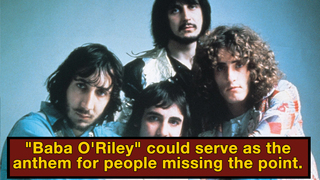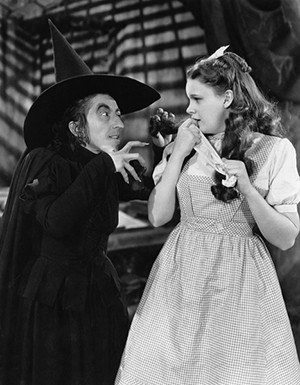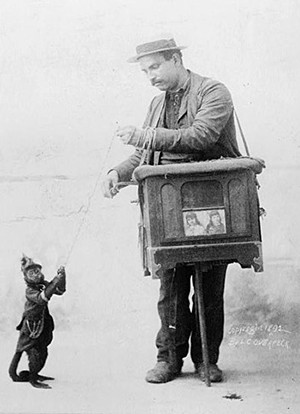5 Songs That Only Became Popular Because We Missed Their Meanings

Ronald Reagan famously misinterpreted "Born in the U.S.A.," thinking it was about how awesome America was, spacing out during the lyrics about out-of-work vets hounded by memories of dead friends lost in a pointless war. The Gipper wasn't the only one to miss the point. Pop music can be deceptively deep, and so some songs are only beloved and remembered due to us being completely oblivious.
Funny enough, when those smash hits make millions of dollars, artists generally don't seem in too much of a hurry to correct us ...
"Have Yourself a Merry Little Christmas" Is About A Father Destroying His Family's Lives For Money
Don't Miss
Commissioned for the musical Meet Me In St. Louis, Ralph Blane & Hugh Martin churned out one of the most memorable Christmas songs ever written and one of Judy Garland's signature numbers. Everybody loves a warm, cozy Christmas song. Too bad "Have Yourself a Merry Little Christmas" isn't one.
It's actually about hard times and the economic necessity to pack up and take your family away from your small, close-knit little community to relocate to New York City, left only with pale memories of better times. Near the end of the film, Garland sings of friends and memories that are lost and might never be recovered, echoed in the line, "Until then we'll have to muddle through somehow," with the scene culminating in a child's emotional breakdown. Not to mention that when Judy Garland sings of trauma, alienation, and lost innocence, she speaks as an authority.

The song was so depressing that it was altered twice. First changed only superficially, altering the breathtakingly-nihilistic line: "Have yourself a merry little Christmas, It may be your last," to the slightly less pathetic: "Have yourself a merry little Christmas. Let your heart be light," the song remaining very downbeat. And then a second time, the song altered by Frank Sinatra, who made it a habit of changing other songwriter's lyrics, turning it saccharine and easily digestible. While Garland's rendition remains the more iconic, the melancholy truth has been wiped away by a cheery erasure ... which is probably the most on-point message for child stardom imaginable.
"The Clown Song" Was Written as an Epic, Heroic Theme
Nobody knows what it is called, but once you hear "clown music," you'll know it immediately.
If you have coulrophobia, shoot, we probably should have given you a trigger warning or something before we dropped that song. Sorry.
The disconnect between intent and interpretation apparent when you learn that the goofy sounding tune was originally titled: "Entrance of the Gladiators." And, no, the title is in no way being sarcastic; this was intended to be a grandiose, dramatic, awe-inspiring march to be played by a real military band or orchestra instead of an organ grinder in a circus.
The piece was written in the era when marches were the hottest genre of music, with no shortage of wars to play it during. Tonally, it was conceived to summon the pomp and life-and-death struggle that was armed combat in the Coliseum to life. It was composed by Czech military bandleader and prolific composer Julius Fucik, who, in all certainty, did not have a fez-bedecked simian sidekick.

Fucik approached his craft with great pride, studying under the tutelage of master Antonin Dvorak and touring across Europe, a respected figure. All well and good until one day, his song, also known as "Grande Marche Chromatique," was reworked by a Canadian arranger as "Thunder and Blazes," forever destroying Fucik's creation. The tune would never be taken seriously by anyone not wearing greasepaint and a red nose ever again.
"Baba O'Riley" Is an Ode to Meditation and Warding off Peer Pressure
The Who's "Baba O'Riley" -- or as it is usually referred to by everyone who isn't a Rolling Stone writer, "Teenage Wasteland" -- quickly attained status as a stoner classic. It's a go-to title or reference for anything involving kids experimenting with drugs and rebelling against their parents.
Need background music to illustrate the generation gap while you give attention-seeking adolescents national TV coverage? Got ya covered:
"What are your kids doing in a back alley when you're at work? Footage at 11!"
However, The Who's Pete Townshend was not a dropout nor a casual-drug enthusiast like every other rock idol when he wrote "Baba O'Riley." He penned the song when he was fed up with the cliched rock persona, making a point about drug dependency as a literal case of wasted potential. Townshend was really interested in trying to persuade us to open ourselves up to love and nourish our consciousness in a land of spiritual desolation. He failed, drowned out by the sound of a million bubbling bongs.
"Baba" refers to mute guru and avowed living god Meher Baba, of who Townshend was a zealous adherent. The mystic preached abstinence from drugs, with The Who songwriter gushing, "I felt more keen about getting into Meher Baba than I felt about being stoned all my life." Listeners? They just wanted an awesome keyboard riff and refrain they could blast out a car window as they peeled out of the high school parking lot to pick up munchies.
"Song 2" Is a Smug Criticism of American Musical Tastes
The English "Brit-pop" outfit Blur was mostly overlooked by America in the mid-90s, with the grunge bands stealing all the spotlight. In response, "Song 2," off their fifth studio album, was conceived as a joke. It imitates American grunge groups' distorted, wailing guitar sound while also mocking their fan bases' hyperactive antics, whom the band perceived as having trash taste. Even the title reminiscent of a hunk of molded plastic that rolls off an assembly line.
"Song 2" was a rebuke of everything that grunge stood for and a celebration of Blur's Brit Pop genre. But, just like today, no one in America gave a shit about British musical pretensions, with listeners blasting it alongside grunge band de jour. Joining the pantheon of incoherent but catchy rock staples, the song was locked in at sports arenas and frat-party playlists.
Sounding like nothing the band had made to date ...
... nobody understood the joke, assuming Blur were altering their sound and trying to appeal to Americans, yet more identical, skinny white dudes wailing over electric guitars. Their hit came to represent everything the singers were opposed to, as it became the most requested rock song on MTV. In America, it remains their only recognizable song despite a sizable back catalog. Blur seemed to forget about their message too and embraced it as their career-defining hit:
"Stayin' Alive" Details Escaping a Depressing, Crumbling Shithole
Soaring into the zeitgeist, fresh off the Saturday Night Fever soundtrack, "Stayin' Alive" was the biggest hit and most recognizable single of the Bee Gees, the song emblematic of the disco era and decade. As the lyrics: "Somebody help me," and "Life goin' nowhere," clearly hints at, the song was not designed to chronicle the local discotheque's joys.
The Gibb Brothers were Brits, raised in Australia, and the song recorded in France. Their knowledge of America was limited to hotel rooms, buses, and newspapers. "The lyrics very obviously state the scenario of survival in the city, and it's not about disco dancing at all," Robin Gibb said. The city is New York, and survival being used quite literally. In 1977 the Big Apple was a laughingstock. If you know anything about its reputation as a failed, crime-ridden, miserable dump, you can figure it out what reality the song was really getting at...
The Bee Gees were trying to be profound, and we didn't give them a chance. The line "New York Time's effect on man," is explained by the co-writer Barry Gibb, describing the song as bleak and intended for "desperate" people "crying out for help," explaining why the music video was shot in a rubble-laden slum. There is a line about "dancing shoes," but considering the rest of the song's content, it's metaphorical at best; according to Robin Gibb, the band completed "Stayin' Alive" without even knowing the John Travolta film's plot.
Top image: MCA Records